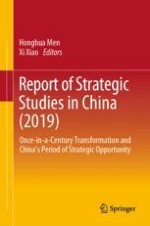2021 | OriginalPaper | Buchkapitel
Transformation of International Order, Globalization and External Constraints on China’s Opening-Up
verfasst von : Hongzhong Liu
Erschienen in: Report of Strategic Studies in China (2019)
Verlag: Springer Singapore
Aktivieren Sie unsere intelligente Suche, um passende Fachinhalte oder Patente zu finden.
Wählen Sie Textabschnitte aus um mit Künstlicher Intelligenz passenden Patente zu finden. powered by
Markieren Sie Textabschnitte, um KI-gestützt weitere passende Inhalte zu finden. powered by
